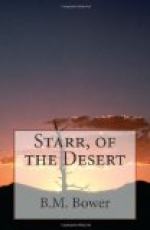He crept closer to the Basin side of the peak and looked down, following an impulse he did not try to analyze. Certainly he did not expect to see any one, unless it were Vic, so he had a little shock of surprise when he saw Helen May riding the pinto up past the spring, with a man walking beside her and glancing up frequently into her face. Starr was human; I have reminded you several times how perfectly human he was. He immediately disliked that man. When he heard faintly the tones of Helen May’s laugh, he disliked the man more.
He got down, with his head and his arms—the left one was lame in the biceps—above a rock. He made sure that the sun had swung around so it would not shine on the lenses and betray him by any heliographic reflection, and focussed his glasses upon the two. He saw as well as heard Helen May laugh, and he scowled over it. But mostly he studied the man.
“All right for you, old boy,” he muttered. “I don’t know who the devil you are, but I don’t like your looks.” Which shows how human jealousy will prejudice a man.
He saw Vic throwing rocks at something which he judged was a snake, and he saw Helen May rein the pinto awkwardly around, “square herself for action,” as Starr would have styled it, and fire. By her elation; artfully suppressed, by the very carelessness with which she shoved the gun in its holster, he knew that she had hit whatever she shot at. He caught the tones of Holman Sommers’ voice praising her, and he hated the tones. He watched them come on up to the little house, where they disappeared at the end where the mesquite tree grew. Sitting in the shade there, talking, he guessed they were doing, and for some reason he resented it. He saw Vic lift a rattlesnake up by its tail, and heard him yell that it had six rattles, and the button was missing.
After that Starr turned his hack on the Basin and began to search scowlingly the plain. He tried to pull his mind away from Helen May and her visitor and to fix it upon the would-be assassin. He believed that the horseman he had seen earlier in the day might be the one, and he looked for him painstakingly, picking out all the draws, all the dry washes and arroyos of that vicinity. The man would keep under cover, of course, in making his getaway. He would not ride across a ridge if he could help it, any more than would Starr.
Even so, from that height Starr could look down into many of the deep places. In one of them he caught sight of a horseman picking his way carefully along the boulder-strewn bottom. The man’s back was toward him, but the general look of him was Mexican. The horse was bay with a rusty black tail, but there were in New Mexico thousands of bay horses with black tails, so there was nothing gained there. The rider seemed to be making toward Medina’s ranch, though that was only a guess, since the arroyo he was following led in that direction at that particular place. Later it took a sharp turn to the south, and the rider went out of sight before Starr got so much as a glimpse at his features.




